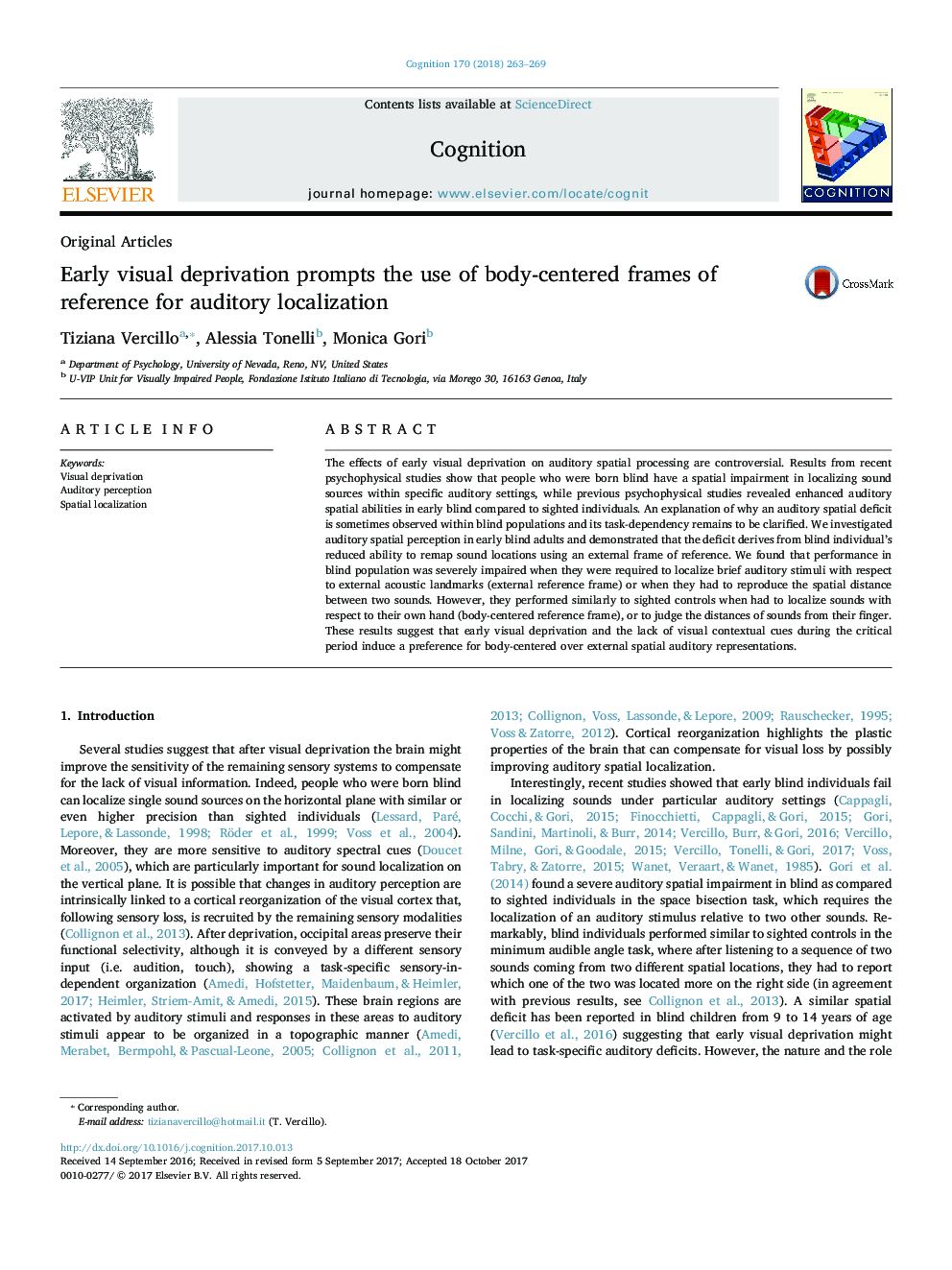| کد مقاله | کد نشریه | سال انتشار | مقاله انگلیسی | نسخه تمام متن |
|---|---|---|---|---|
| 7285683 | 1474097 | 2018 | 7 صفحه PDF | دانلود رایگان |
عنوان انگلیسی مقاله ISI
Early visual deprivation prompts the use of body-centered frames of reference for auditory localization
ترجمه فارسی عنوان
محرومیت از قبل محرمانه، استفاده از مرزهای محور مرجع برای محلی سازی شنوایی را به ارمغان می آورد
دانلود مقاله + سفارش ترجمه
دانلود مقاله ISI انگلیسی
رایگان برای ایرانیان
کلمات کلیدی
محرومیت ویژوال، ادراک شنوایی، محلی سازی فضایی،
ترجمه چکیده
اثرات محرومیت زودرس فوری در پردازش فضایی شنوایی بحث انگیز است. نتایج مطالعات روانپزشکی اخیر نشان می دهد افرادی که به کوره متولد شده اند اختلال فضایی در منابع محلی صدا در محیط های شنوایی خاصی وجود دارد، در حالی که مطالعات روان شناختی قبلی نشان می دهد توانایی های فضایی شنوایی در اوایل کور در مقایسه با افراد چشمگیر افزایش یافته است. توضیح اینکه چرا کمبود فضایی شنوایی گاهی در جمعیت های کور دیده می شود و وابستگی به کار آن هنوز روشن است. ما درک افراد فضایی شنیداری در بزرگسالان مبتلا به نابینایان را بررسی کردیم و نشان دادیم که کسری بودجه ناشی از توانایی کاهش توانایی نابینایان برای تغییر مکان صدا با استفاده از یک مرجع خارجی است. ما دریافتیم که عملکرد در جمعیت کور به شدت تحت تاثیر قرار می گیرد زمانی که آنها مورد نیاز برای محاسبه محرک های شنیداری کوتاه با توجه به نشانه های آکوستیک خارجی (فریم مرجع خارجی) و یا زمانی که آنها مجبور به پخش فاصله فضایی بین دو صدا. با این حال، آنها با توجه به دست خود (مرجع مرکز مرکز مرکزی)، و یا برای محاسبه فاصله از صداها از انگشتانشان، به صورت مشابهی به کنترل های بینظیر عمل کردند. این نتایج نشان می دهد که محرومیت زودرس و فقدان نشانه های بصری در طی دوره بحرانی، ترجیح می دهد که تمرکز بیشتری بر نمایه های شنوایی فضایی خارجی داشته باشد.
موضوعات مرتبط
علوم زیستی و بیوفناوری
علم عصب شناسی
علوم اعصاب شناختی
چکیده انگلیسی
The effects of early visual deprivation on auditory spatial processing are controversial. Results from recent psychophysical studies show that people who were born blind have a spatial impairment in localizing sound sources within specific auditory settings, while previous psychophysical studies revealed enhanced auditory spatial abilities in early blind compared to sighted individuals. An explanation of why an auditory spatial deficit is sometimes observed within blind populations and its task-dependency remains to be clarified. We investigated auditory spatial perception in early blind adults and demonstrated that the deficit derives from blind individual's reduced ability to remap sound locations using an external frame of reference. We found that performance in blind population was severely impaired when they were required to localize brief auditory stimuli with respect to external acoustic landmarks (external reference frame) or when they had to reproduce the spatial distance between two sounds. However, they performed similarly to sighted controls when had to localize sounds with respect to their own hand (body-centered reference frame), or to judge the distances of sounds from their finger. These results suggest that early visual deprivation and the lack of visual contextual cues during the critical period induce a preference for body-centered over external spatial auditory representations.
ناشر
Database: Elsevier - ScienceDirect (ساینس دایرکت)
Journal: Cognition - Volume 170, January 2018, Pages 263-269
Journal: Cognition - Volume 170, January 2018, Pages 263-269
نویسندگان
Tiziana Vercillo, Alessia Tonelli, Monica Gori,
